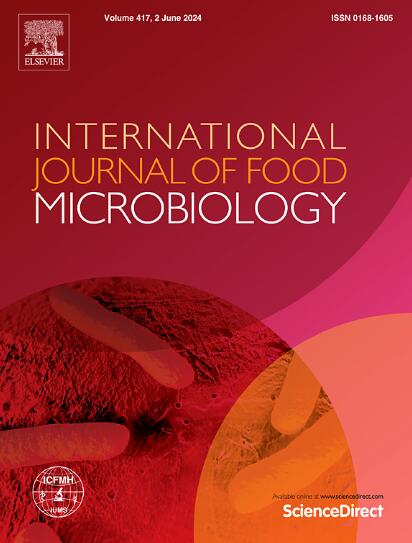High-pressure processing and heat treatment of Murrah buffalo milk: Comparative study on microbial changes during refrigerated storage
IF 5
1区 农林科学
Q1 FOOD SCIENCE & TECHNOLOGY
International journal of food microbiology
Pub Date : 2024-10-02
DOI:10.1016/j.ijfoodmicro.2024.110926
引用次数: 0
Abstract
This study aims to evaluate the effect of high-pressure processing (HPP) (500 and 600 MPa for 3 min and 5 min) on the microbial changes of Murrah buffalo milk in comparison to heat treatment (72 °C for 15 s of holding time) during refrigerated storage of 28 days. The results indicated that the total plate count (TPC) of raw milk at day 0 was 5.5 ± 0.6 log10 CFU/mL. At day 0, heat treatment lowered TPC to 3.9 ± 0.6, while HPP treatment was in the range of 4.1 ± 0.3 to 4.8 ± 0.6 log10 CFU/mL. Similarly, lowered yeast and mold count and lactic acid bacteria were noted in heat- and HPP-treated milk samples compared to the control sample during refrigerated storage. There were no Staphylococcus aureus and Escherichia coli detected in heat and HPP-treated samples. Heat or HPP treatment at 600 MPa for 5 min significantly extended the shelf-life of Murrah buffalo milk for three weeks at the refrigerated storage. In addition, HPP treatment did not alter the pH, lightness (L* value), protein, or fat content of Murrah buffalo milk during refrigerated storage. Hence HPP at 600 MPa for 5 min could be a suitable alternative to conventional heat treatment.
Murrah 水牛奶的高压加工和热处理:冷藏期间微生物变化的比较研究。
本研究旨在评估在冷藏贮存 28 天期间,高压处理(HPP,500 和 600 兆帕,3 分钟和 5 分钟)与热处理(72 °C,15 秒保温时间)相比对穆拉拉水牛奶微生物变化的影响。结果表明,生牛奶在第 0 天时的菌落总数(TPC)为 5.5 ± 0.6 log10 CFU/mL。在第 0 天,热处理将 TPC 降至 3.9 ± 0.6,而 HPP 处理的范围为 4.1 ± 0.3 至 4.8 ± 0.6 log10 CFU/mL。同样,与冷藏储存期间的对照样本相比,加热和 HPP 处理过的牛奶样本中的酵母菌、霉菌和乳酸菌数量也有所减少。在加热和 HPP 处理过的样品中没有检测到金黄色葡萄球菌和大肠杆菌。在 600 兆帕的压力下加热或 HPP 处理 5 分钟可明显延长伊拉水牛奶在冷藏条件下三周的货架期。此外,在冷藏储存期间,HPP 处理不会改变伊拉水牛奶的 pH 值、亮度(L* 值)、蛋白质或脂肪含量。因此,在 600 兆帕的压力下进行 5 分钟的 HPP 可作为传统热处理的合适替代方法。
本文章由计算机程序翻译,如有差异,请以英文原文为准。
求助全文
约1分钟内获得全文
求助全文
来源期刊
CiteScore
10.40
自引率
5.60%
发文量
322
审稿时长
65 days
期刊介绍:
The International Journal of Food Microbiology publishes papers dealing with all aspects of food microbiology. Articles must present information that is novel, has high impact and interest, and is of high scientific quality. They should provide scientific or technological advancement in the specific field of interest of the journal and enhance its strong international reputation. Preliminary or confirmatory results as well as contributions not strictly related to food microbiology will not be considered for publication.

 求助内容:
求助内容: 应助结果提醒方式:
应助结果提醒方式:


